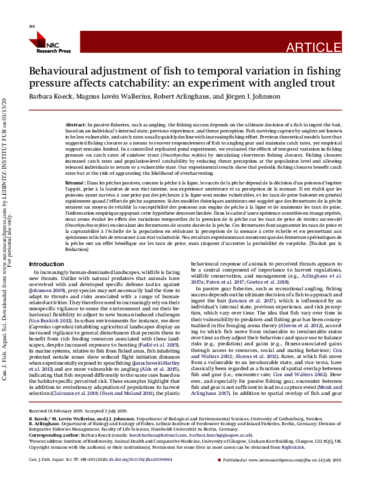In passive fisheries, such as angling, the fishing success depends on the ultimate decision of a fish to ingest the bait, based on an individual’s internal state, previous experience, and threat perception. Fish surviving capture by anglers are known to be less vulnerable, and catch rates usually quickly decline with increasing fishing effort. Previous theoretical models have thus suggested fishing closures as a means to recover responsiveness of fish to angling gear and maintain catch rates, yet empirical support remains limited. In a controlled replicated pond experiment, we evaluated the effects of temporal variation in fishing pressure on catch rates of rainbow trout (Oncorhynchus mykiss) by simulating short-term fishing closures. Fishing closures increased catch rates and population-level catchability by reducing threat perception at the population level and allowing released individuals to return to a vulnerable state. Our experimental results show that periodic fishing closures benefit catch rates but at the risk of aggravating the likelihood of overharvesting.
Behavioural adjustment of fish to temporal variation in fishing pressure affects catchability: an experiment with angled trout
Peer-reviewed

Koeck, B., Wallerius, M. L., Arlinghaus, R., Johnsson, J. I. (2020). Behavioural adjustment of fish to temporal variation in fishing pressure affects catchability: an experiment with angled trout. Canadian Journal of Fisheries and Aquatic Sciences, 77, 188-193
Published
: 2020
Appeared in
: Canadian Journal of Fisheries and Aquatic Sciences, 77, 188-193
